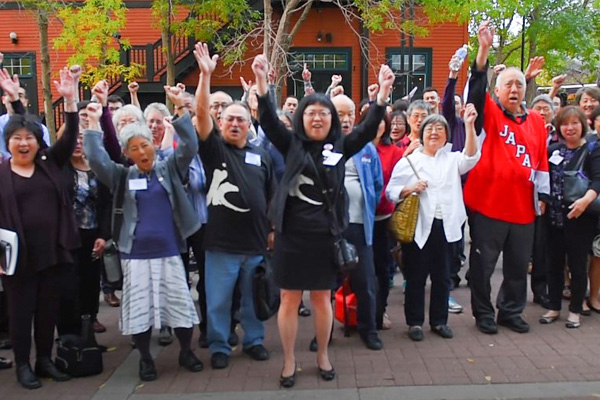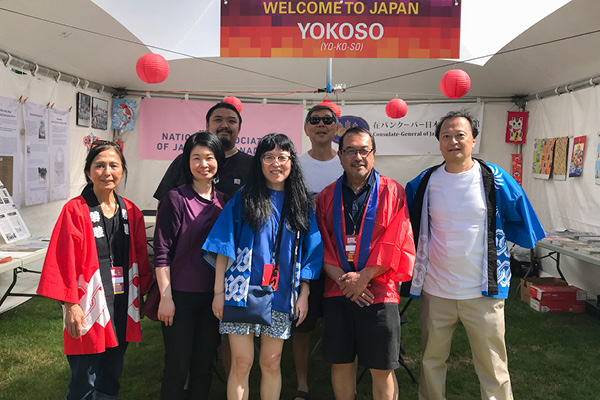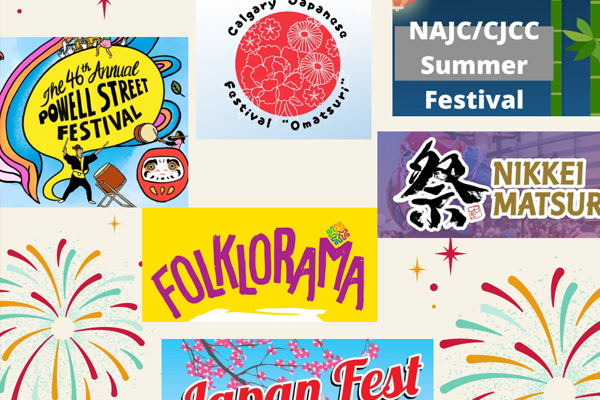by Lorene Oikawa
By the time you read this, we will know if Wiarton Willie (Wiarton, Ontario), Shubenacadie Sam (Nova Scotia) or Fred la marmotte (Quebec) have seen their shadow on February 2, Groundhog Day. If they do then we are told we will have six more weeks of winter and if they don’t then spring will arrive early. While it lacks scientific rigour, it does make for a fun tradition.
Japanese have their own traditions including Setsubun on February 3rd. This annual event is usually held at schools and homes with little children. The father or a teacher puts on an oni mask and pretends to be an ogre or devil. The kids chase him and throw roasted soybeans at him. They say “Oni wa soto!” [Ogres out!] and after getting rid of him they throw soybeans from outside to inside saying, “Fuku wa uchi!” [Good luck inside!]
January was a busy month. A couple of highlights. I joined the new Consul General of Japan in Vancouver Takashi Hatori and members of the Japanese Canadian community at a New Year’s celebration including “breaking” open a cask of sake. I also had the honour of witnessing Mary Kitagawa receive the Wallenberg-Sugihara Civil Courage Award. Mary, a recipient of the Order of British Columbia, is a Japanese Canadian leader who has done so much to raise awareness of the history of Japanese Canadians and to right the wrongs of racism. When she shares her account of being a young child during the Second World War and seeing her father being taken away from the family, it’s such a heart wrenching story which allows others to understand the trauma faced by those who were interned.
One of Mary Kitagawa’s achievements was to persuade the University of British Columbia to recognize 76 Japanese Canadian UBC students who were unjustly removed in 1942. In 2012, the surviving students and other students represented by family members received honorary degrees.
I have a personal connection to the story. I was helping gather signatures for a petition to lobby UBC. Mary and her husband Tosh Kitagawa had prepared a list of names of the 1942 UBC Students and shared it with me. I saw one name and wondered if it could be my Uncle Ted, my mom’s cousin Ted (Teruo) Harada. It was my turn to do a bit of research with my family and I discovered it was Uncle Ted. Unfortunately he wasn’t able to attend the ceremony because of his health and he asked me to receive his degree. I wore the cap and gown just like when I received my degree except this was a historic moment. The whole place burst into applause and tears when the surviving students made their way across the stage. I was so glad that Uncle Ted was able to watch the live stream of the ceremony.
Mary’s award was given to her by the Wallenberg-Sugihara Civil Courage Society which was formed by members of the Swedish and Jewish communities and recognizes individuals who at personal risk have helped to improve or save the lives of others by working against unjust laws or protocols. The award pays tribute to Raoul Wallenberg and Chiune Sugihara.
Raoul Wallenberg was Sweden’s special envoy in Budapest, and from July to December 1944, he issued passports to Jews and housed them in buildings that were designated as Swedish territory. He rescued up to one hundred thousand Jews in Nazi-occupied Hungary. After the Soviets captured Budapest in 1945, Wallenberg was detained on suspicion of espionage and disappeared.
Chiune Sugihara was the Vice-Consul for Japan in Lithuania during the Second World War. Despite orders to not issue transit visas to Jewish refugees, he signed thousands of visas, each visa good for one family. The visas had to be handwritten so he reportedly spent hours per day to produce a month’s worth of visas each day. Witnesses said he was still writing visas when the consulate was closed and he was flinging them out of the train as he left. He risked his career and the lives of his family to save more than 6,000 Jewish refugees.
We need to remember these courageous actions and help people to be inspired to work for the safe, inclusive, thriving society we desire.
We have an update on our discussions with the BC government. As we have previously reported we are looking for some meaningful follow up to the BC government apology in 2012. The first phase of this process is to hear from the Japanese Canadian community and we propose to do this through community consultations. The BC government supports this first step of community consultations. We will be working on a plan for in-person and virtual meetings and looking to work with our member organizations. We will continue to report on our work through our e-news, our national membership meetings, and other communication channels.



